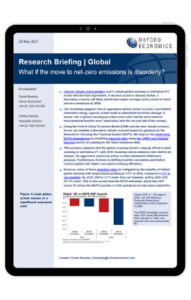What if the move to net-zero is disorderly?

Current climate action pledges won’t contain global warming to well below 2°C in line with the Paris Agreement. If decisive action is delayed further, a disorderly scenario will likely unfold and require stronger policy action to reach net-zero emissions by 2050.
Our modelling suggests that an aggressive global carbon tax policy and limited renewable energy capacity would result in substantial economic damage. A slower rate of global warming provides some relief, but the most material environmental benefits won’t materialise until the second half of the century.
Download this report to learn about:
- Late policy action comes at a significant economic cost
- Carbon tax pushes inflation higher, until a shift towards cheaper energy sources
- Recycling revenues mitigates the economic damage of transition in short term
Tags:
Related Services

Post
Food prices to bottom out in 2024, risks skewed to upside
Our baseline forecast is for world food commodity prices to register an annual decline this year, in aggregate, reducing pressure on food retail prices further downstream. However, we believe the risks to this forecast are overwhelmingly skewed to the upside.
Find Out More
Post
Battery raw material prices to recover
Battery raw materials prices bottomed out last quarter and we think a sustained recovery is looming. Midstream EV battery manufacturing activity has picked up again and inventories have returned to historical levels, suggesting upstream demand for raw materials will also bounce back.
Find Out More